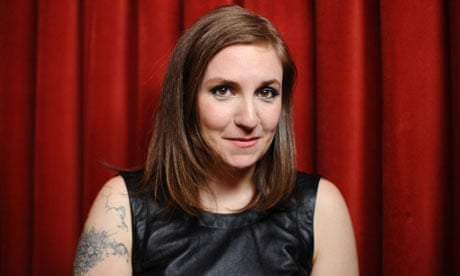Think of popular culture's great slackers – Bill, Ted, "Dude" Lebowski, the many schlubs of Judd Apatow's movies – and you realise that what unites them is not just their use of the word "dude": it's that they are all dudes. On screen and on page, slackerdom has forever been a curiously male preserve, as if the glorification of idleness and a cheerfully non-aspirational attitude were dependent on an extra chromosome. This might be the year that changes that. Right now, a welter of films, books and TV shows from both sides of the Atlantic is yielding a new cultural archetype: the girl slacker. The version of twentysomething womanhood being reflected back at us in 2012 isn't dressed in Louboutins, busy ball-breaking in boardrooms: she's eating cereal, in her pants, in her parents' basement.
There's a kind of mock heroic pride to that and it's one mixed up in their autobiographical quality: most of these characters are being authored by young women for whom a struggle to find a job, or even a sense of direction, has proved creatively fruitful. Their aimlessness, in other words, has come to have a point.
In New York, Leigh Stein is a smart, animated 26-year-old who has written about loserdom and achieved success with it. She has just published her first book, The Fallback Plan, to swooning reviews. It's a sweet, strange and hilarious autobiographical novel about moving back home after graduation, told in the voice of Esther – who, like her author, is a former acting student. Unlike Stein, Esther languishes in her parents' home, rereading books from her childhood, while desultorily popping Vicodin and hoping to contract a chronic illness that will exempt her from life. And yes, she is fond of eating cereal in her pants. Specifically, Cinnamon Toast Crunch while wearing "the T-shirt I had worn to bed the night before" – a wolf-emblazoned number she describes as, "my so-ugly-it's-awesome T-shirt, but my parents didn't appreciate that, even after I explained it to them".
I meet Stein in a SoHo cafe where, rather than outsized ironic T-shirt, she is working an admirably stylish line between bohemian and smart in a colourful skirt and boots. Esther may embody slackerdom but Stein herself, a former New Yorker staffer and widely published poet, bridles in mock horror at the term.
"I have such a major reaction to that word!" she laughs. "I don't want anyone to call me a slacker!" But she happily admits that, "when I think of Esther I think the humour comes from her being a loser, tiptoeing that line. But slacker women – this is a new thing, I think. As I was writing it, I didn't know that kids moving home was a thing – it was just something that had happened to me and I wanted to write about. But now, I'm very lucky that it's landing at this time – it's like this perfect storm, it's all happening."
The book, she admits, has an unexpected touch of wish-fulfilment to it. "It's my fantasy of what would happen if I gave up," she explains. "I feel like I work so hard and sometimes it's like why? Why do I work so hard? Why don't I give up and be stoned for the next 20 years? I get this sense of entitlement: we feel like we did everything we're supposed to, we went to college and got a degree and everyone told us that if we got a degree we'd get a good job and it's like, 'where is my good job, hello?'"
That, of course, is a question millions of young men and women are asking. One survey suggested that up to 85% of new graduates in 2011 were likely to move back in with their parents. In the UK, where youth unemployment is at an unprecedented one million, it's estimated at 27%. If one of the key tenets of slacking is simply living with your mum and dad and being unemployed, then we are a nation of accidental slackers.
"I've lived at home four times in my early 20s," Stein admits. "I'd move to New York and then I'd run out of money and come home and live with my parents. Now it's just the thing that you do – you graduate from school and you go home. And then it's just a matter of how long you stay there."

For 28-year-old Nat Luurtsema, a Watford-born stand-up comedian, it was meant to be for a month at most. Six months later, she was still there. "I bought a onesie half way through," she says darkly, "that's really giving up isn't it? A onesie in the shape of a red panda. The day I went to the newsagent in the onesie and wellies I just thought yes, I've completely given up on any sort of dignity."
But, like Stein, she realised that losing sight of one's dignity translates to rich comic ground.
"I started blogging about it every evening," says Luurtsema. "Just out of frustration, just out of needing to bitch to someone, and it was amazing how many people started reading it and getting in touch to say 'I'm in exactly the same position.' It's funny – it really felt like my life was in such a crappy patch and yet from that situation came a load of new ideas."
It gave rise to a book deal: her very funny memoir, Cuckoo In The Nest, will be published next month by Hodder & Stoughton. Lots of the book's humour comes from an awareness of the gender double standard that surrounds living with one's parents.
"In pop culture there are so many instances of cool slacker guys and great films that make it seem so cool and aspirational to just live in your parents' basement," she says. "Among me and my friends it seemed that [a man living at home] is a bit more usual and a bit more acceptable. Girls are a bit more 'Come on adulthood, let's get this show on the road!' and the boys are a bit more, 'Well the meals are so nice and prompt…'
"For women, or for me anyway, I got suckered into TV shows that sold me this idea of the woman in high heels who was taking on a man's world. It was like, Yeah! I can do all those things!"
She agrees that those TV cliches – the ferociously focused career woman and the happily slacking guy – seem to have shaped our expectations in not altogether helpful ways. Back in 2007 the critic David Denby identified this "slacker-striver" dynamic as "the dominant romantic-comedy trend of the past several years".
We've yet to have a film in which that dynamic is reversed entirely, but living in what Emily Nussbaum, the New Yorker's TV critic, has deemed, "a golden age for female comedy", is certainly helping to weaken it. Perhaps the best-loved example of TV's golden age is the NBC series 30 Rock, or specifically the character of Liz Lemon, played by Tina Fey. Much of the show's humour comes from Liz Lemon's slacker tendencies: she may be a powerful TV executive but that doesn't mean she has any shame about revelling in nights in with a plate of cheese and a slanket. Fey is something of an idol to perhaps the most-discussed girl-slacker on her side of the Atlantic: envied and loathed as much as she is emulated and adored, Manhattan-born Lena Dunham has become an accidental icon for the millennial generation.
Shortly after graduating, Dunham – jobless, dejected and stewing in a frustrated sense of entitlement – made a film about being jobless, dejected and stewing in a frustrated sense of entitlement. Tiny Furniture is 25-year-old Dunham's name-making feature film in which she plays a version of herself – mostly in states of trouserless disaffection: the defining image of the film is of Lena-as-Austra, dressed in just her pants and a slightly too-tight T-shirt, padding morosely through her mother's sleek Manhattan apartment. Like Stein's Esther, who tells herself "Sofia Coppola should hire you as her personal assistant", Dunham-Austra has an outrageous sense of her own entitlement, mixed with excessive self-pity. It sounds deeply unappealing, but Dunham is so shrewd, so self-lacerating, that it becomes hilarious and strangely sympathetic.
"I just got out of school. This is a very hard time for me," Austra blubs, when confronted by her mother about her inactivity. "If you didn't notice, I had my heart broken, OK? And I'm a young, young person, who is trying very hard."
When the film opened in the US last year Dunham was acclaimed as the voice of her generation. Fame, acclaim and – ultimately – her own Judd Apatow-produced HBO show followed. Girls, which opens in the US next month, will follow the lives of four recently graduated young women struggling to make it in New York. Ever self-aware, Dunham seems to poke fun at her own hype in a trailer for her show: "I think that I may be the voice of my generation," says her character earnestly. A pause. "Or at least, a voice, of a generation."
If Dunham is anything to go by, the chief characteristic of her generation is a kind of creative solipsism: nothing is better material than the absurdities and contradictions of her own life. Dunham's Twitter page reads, "My life is my art and therapy is my palette" and the fact that napping is something of a tweet trope ("I lived close enough to high school to go home and take a nap during lunch and I didn't understand it wouldn't always be that way"; "I'll know I've made it when I can nap at 11am without guilt or fear") attests to shades of slackerdom in life as well as art.
Successfully mining personal experience of underachievement has, of course, its ironies, as Dunham is the first to admit: " There is something essentially unappealing about 'girl makes movies about being a loser and then gets un-loserly things to happen to her'. It's a little absurd."
Less absurd though, is the way in which Dunham has embraced the taboo territory of looking less than groomed. She has pointed out that "People have been more willing to forgive a male character's flaws. And that's probably something I'll be unpacking for most of my career and trying to understand why that is and where you can take female characters that people try to not let you take. I felt like there was time to see a certain kind of female character that we hadn't met before. And it's funny, so I hoped that women would respond to it. But it's been really interesting with men also being responsive to seeing a girl more real, more responsive than I ever thought that they would be."
In Tiny Furniture Dunham's onscreen unmade up face, or slightly dimply thighs, shouldn't seem extraordinary, but they do: they're a reminder that girl slackerdom can, in fact, take on a radical quality. The New York Times film critic Manohla Dargis wrote: "It is Ms Dunham's refusal to put on a pretty show, to doll herself up, that is the movie's boldest stroke" and Dunham is smart enough to know this. She has made it clear that "in Tiny Furniture I look sloppier and more slovenly than I do in real life. I'm doing the full-on thing. I made a choice there."
That choice seems to be a direct reaction to what Mindy Kaling, a Saturday Night Live comedian, identifies as "the skinny woman who is beautiful and toned but also gluttonous and disgusting". Kaling's recent book, Is Everyone Hanging Out Without Me? (And Other Concerns) has an entry on "Types of Women in Romantic Comedies Who Are Not Real". As well as the above-mentioned implausible slob, they include "The Woman Who Is Obsessed With Her Career Who Is No Fun At All". "Having a challenging job in movies," Kaling observes, "means the compassionate, warm or sexy side of your brain has fallen out."
But characters like Dunham's, as well as Kristen Wiig's in last year's Bridesmaids, are doing a lot to oust that nasty Hollywood stereotype: perhaps the reign of the prissy, humourless and overachieving harridan – the female foil to cheerful male apathy – is on the way out. Anita Sarkeesian, a pop culture critic who runs the blog Feminist Frequency, cautiously welcomes its demise. "I think it's kind of interesting; these characters are trying to figure things out and they're being pushed up against traditional values which they don't agree with necessarily. I feel like a lot of those female archetypes are reactions to not having strong or fully authentic female characters – it seems as though this particular trope has the opportunity to be a lot more real and genuine and deal with authentic struggles."
One of those struggles is the at once basic and enormous task of how to grow up. As books like Richard Settersten's Not Quite Adults remind us, it's a process that is somehow slower and trickier for this generation of extended adolescents.
"Biologically we can have babies later, we can get married later so everything's just taking longer," says Leigh Stein. "Growing up is just taking longer."

That's something Miranda July explores. As the arch-example of a multi-stranded creative career, writer-director-actor-artist-performer July certainly doesn't qualify as a slacker. She does, however, bring an existential slant to slacking in her latest film, The Future. July plays the anxiously underachieving and responsibility-fearing Sophie, who counts down the days until she and her partner pick up their adopted cat: a day freighted with symbolic importance since, in her mind, it will be the day they become adults. The two spend a lot of time inert and worrying about it.
It suggests that there might be something almost noble and certainly necessary about idling, that female slackerdom is not just funny, but that perhaps feeling paralysed on your sofa is a necessary part of working out your place in the world.
Is it too much of a stretch to see the rise of the girl slacker as a bit of a feministic triumph?
"It's always kind of awkward to describe something as feminist or not, right?" says Sarkeesian, when I put the question to her. But caveats aside, "I think to the extent that it could be creating authentic, human female characters, it is a push towards a more feminist media."
Luurtsema says: "Perhaps one aspect of feminism has been this refusal to admit you don't know – this insistence on "I can do everything". For me and my peers that's a career thing: never say you can't do anything, you must work so hard and you can't slack off and be rubbish at your career. And maybe there is a certain feminist merit in just being like. You know what, it's not one big fight, it is just my life and I shouldn't feel like I'm constantly fighting."
Stein echoes that sentiment: "There's been all these fights in feminism: we want to work and we want to be compensated like men. And then we get that, or close to that, and we're making these milestones but then it's like, Wait a second, do we get to sleep? Why can't we just be like the bros?"
In A Room Of One's Own, Virginia Woolf writes (and if Woolf sanctions it, it must be OK): "It is in our idleness, in our dreams, that the submerged truth sometimes comes to the top." Perhaps it doesn't matter whether it's in a room of one's own, or a basement of one's parents, a girl's right to slack is to be celebrated.

Comments (…)
Sign in or create your Guardian account to join the discussion